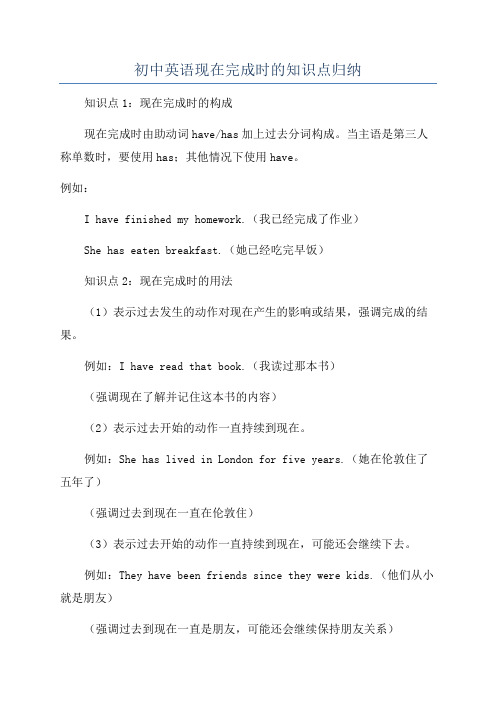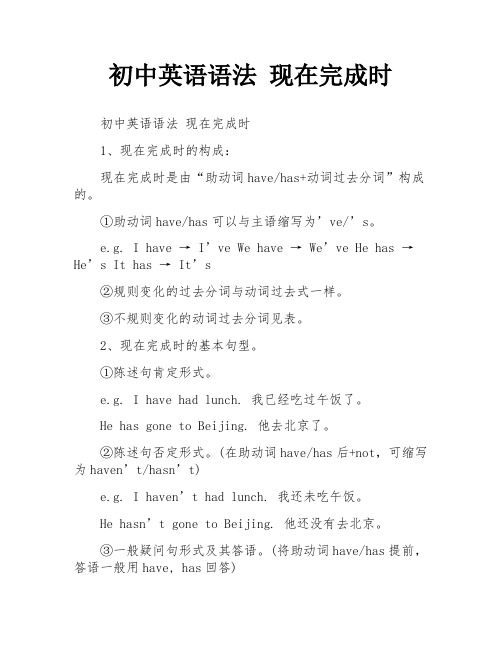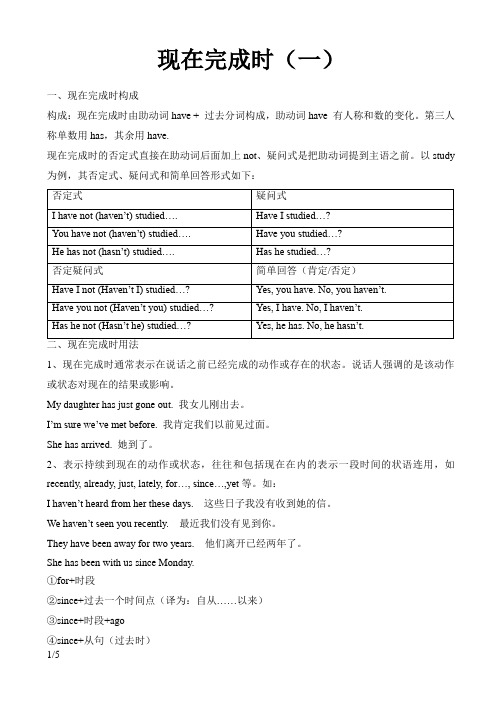初中现在完成时
初中英语现在完成时的知识点归纳

初中英语现在完成时的知识点归纳知识点1:现在完成时的构成现在完成时由助动词have/has加上过去分词构成。
当主语是第三人称单数时,要使用has;其他情况下使用have。
例如:I have finished my homework.(我已经完成了作业)She has eaten breakfast.(她已经吃完早饭)知识点2:现在完成时的用法(1)表示过去发生的动作对现在产生的影响或结果,强调完成的结果。
例如:I have read that book.(我读过那本书)(强调现在了解并记住这本书的内容)(2)表示过去开始的动作一直持续到现在。
例如:She has lived in London for five years.(她在伦敦住了五年了)(强调过去到现在一直在伦敦住)(3)表示过去开始的动作一直持续到现在,可能还会继续下去。
例如:They have been friends since they were kids.(他们从小就是朋友)(强调过去到现在一直是朋友,可能还会继续保持朋友关系)知识点3:现在完成时的时间状语现在完成时常与以下时间状语连用:just(刚刚)、already(已经)、never(从来没有)、ever(曾经)、yet(还、仍然)、recently (最近)、since(自从)、for(持续了多久)等。
例如:I have just finished my homework.(我刚刚完成了作业)Have you ever been to America?(你去过美国吗?)They haven't seen each other since last year.(他们自从去年就没有见过面了)知识点4:现在完成时与一般过去时的区别现在完成时强调的是过去的动作对现在的影响或结果,而一般过去时只表示过去发生的动作或状态。
例如:He has lost his key.(他丢了钥匙,结果是他现在找不到)He lost his key.(他丢了钥匙)知识点5:现在完成时否定句和疑问句的构成现在完成时的否定句和疑问句构成是在助动词have/has之后加not 或否定词,疑问句将助动词have/has提到句首。
2024年中考英语语法复习+—现在完成时课件

Have you seen the doctor? 你看过医生了吗?
在现在完成时中,当主语是I/you/we/they时,助动词用 have;当主语是第三人称单数时,助动词用has。
三、现在完成时的使用
1.表示过去发生并结束的动作对现在所产生的影响
He has left the city. 他已离开了这个城市。(结果:他不在这个城市。)
一、基本构成:have/has+done
I have finished my homework. 我已完成了作业。 (这里的finished就是动词finish的 过去分词。)
二、现在完成时不同人称的用法 I have washed my car.我洗过车子了。
We have done the whole work.我们干完了所有活儿。
A.practised
B.were practising C.have been practising
C
3 . —Where is mother?
—She is in the kitchen. She ________ the
housework all morning.
A.is doing
B.was doing
B.was studying
C.studied
D.have been studying
D
15 . “I _____ as everyone expects ”, Yao Ming
said .
A.haven’t played
B.haven’t been playing
C.didn’t play
D.am not playing
初中英语现在完成时

一般过去时常与具体的表示过去的时间状语连用;
现在完成时常与模糊的时间状语连用,或无时间状语。
一般过去时的时间状语:yesterday, last week, … ago, in June, in 1980, just now… ---具体的时间状语
现在完成时的时间状语:for, since, so far, ever, never, recently, yet, just, till/until, up to now, in the past few years…….---模糊的时间状语
现在完成时
The present perfect tense
现在完成时的结构:
have/:第一、二人称及复数 规则动词
has:第三人称单数 不规则动词
主语+have/has + 过去分词 + 宾语 + 状语
1. Sally took a photo of her friends while they ______ computer games. A. play B. are playing C. have played D. were playing 2. The last time I ______ to the cinema was two years ago. A. go B. have gone C. have been D. went 3.Mark ______ in China for ten years and now he teaches Chinese in Britain.( A. has worked B. worked C. had worked D. is working
He has come here for two years. F The old man has died for five months. F They have left only for three minutes. F 请把以上三个句子改正确 He has been here for two years. The old man has been dead for five months. They have been out only for three minutes.
初中现在完成时讲解ppt

since
for
since
for
since
练习题: 1.It's a long time since we ____ (meet) last, isn't it? 2.--I know you ___________ (choose) a picture book among these. --Yes,Have a look at it, please. 3.So far, spaceships without people ___________ (reach) the moon and some other parts of the universe. 4.My father____ home for nearly three weeks. A.has gone away from B.has left C.has been away from D.went away 5.Mr. and Mrs. Green have_____in China for a week. A.been B.got C.arrived D.reached
eg.--- I’ve lived here for 15 years. eg.--- I’ve lived here since 15 years ago(1990)
选用for和since填空: 1.We haven’t seen each other ______ a long time. 2.His father has been in the factory ______ 10 years ago. 3.The film has been on ______ 20 minutes. 4.Mr Green has worked here ______ he came to China. 5.His grandparents have been dead ______ several years. 6. It’s five years _______ we met last time
初中英语语法 现在完成时

初中英语语法现在完成时初中英语语法现在完成时1、现在完成时的构成:现在完成时是由“助动词have/has+动词过去分词”构成的。
①助动词have/has可以与主语缩写为’ve/’s。
e.g. I have → I’ve We have → We’ve He has → He’s It has → It’s②规则变化的过去分词与动词过去式一样。
③不规则变化的动词过去分词见表。
2、现在完成时的基本句型。
①陈述句肯定形式。
e.g. I have had lunch. 我已经吃过午饭了。
He has gone to Beijing. 他去北京了。
②陈述句否定形式。
(在助动词have/has后+not,可缩写为haven’t/hasn’t)e.g. I haven’t had lunch. 我还未吃午饭。
He hasn’t gone to Beijing. 他还没有去北京。
③一般疑问句形式及其答语。
(将助动词have/has提前,答语一般用have, has回答)e.g. Have you had lunch? 你吃过午饭了没? Yes, I have. No, I haven’t.Has he gone to Beijing? 他去过北京了没有? Yes, he has. No, he hasn’t.否定回答还可以用:No, not yet. / No, never. / No, not even once等。
④特殊疑问句形式。
(疑问词+一般疑问句)e.g. Where has he gone? 他去了哪里?3、现在完成时的三个基本用法。
(1) 现在完成时的第一个基本用法表示过去发生或已完成的某一个动作对现在造成的影响或结果。
e.g. Have you had lunch? Yes, I have. I’ve just had it. 你吃过午饭没?有,吃过了,我刚刚吃的。
(影响及结果:我现在饱了,不需要了)He has gone to Beijing. 他已经去北京了。
初中英语现在完成时详解

现在完成时(一)一、现在完成时构成构成:现在完成时由助动词have + 过去分词构成,助动词have 有人称和数的变化。
第三人称单数用has,其余用have.现在完成时的否定式直接在助动词后面加上not、疑问式是把助动词提到主语之前。
以study 为例,其否定式、疑问式和简单回答形式如下:1、现在完成时通常表示在说话之前已经完成的动作或存在的状态。
说话人强调的是该动作或状态对现在的结果或影响。
My daughter has just gone out. 我女儿刚出去。
I’m sure we’ve met before. 我肯定我们以前见过面。
She has arrived. 她到了。
2、表示持续到现在的动作或状态,往往和包括现在在内的表示一段时间的状语连用,如recently, already, just, lately, for…, since…,yet等。
如:I haven’t heard from her these days. 这些日子我没有收到她的信。
We haven’t seen you recently. 最近我们没有见到你。
They have been away for two years. 他们离开已经两年了。
She has been with us since Monday.①for+时段②since+过去一个时间点(译为:自从……以来)③since+时段+ago④since+从句(过去时)⑤It is+时段+since+从句(过去时)Mary has been ill for three days.I have lived here since 1998.注意:since和for的区别since后接时间点,如1993,last term, yesterday, the time I got therefor后接一段时间,表示“长达多久”,如ten years, a while, two days等。
初中现在完成时讲解完整版
• 2. _____ he ____ (finish) his work today? Not yet. Has, finished
• 3. My father ____ just ____ (come) back from work. He is tired now. has, come
• 4. Where’s Li Ming ? He __________ (go) to the teacher’s office. has gone
He has lived in Beijing since 5 years ago.
since , for 的用法:
•since: (自…以来)
1)since+时间点 NhomakorabeaTake notes
He has stayed here since 5 o’clock. 2)since+ 时间段+ ago
He has stayed here since 5 hours ago. 3)since+ 从句
Present Perfect Tense
现在完成时
past
present(now)
future
现在完成时的结构 主语 + have/ has + 过去分词(pp)
助动词,无意义
Winter has already come, will it still be far in spring ?
现在完成时的结构
She has taught English since he came here.
• for: (长达)
for+ 时间段
He has kept the book for 2 weeks.
初中英语现在完成时态
现在完成时态构成 : 主语 + have/has + 过去分词 + 其他。
否定式 : 主语 + haven't/hasn't + 过去分词 + 其他。
一般疑问式 : Have /Has + 主语 + 过去分词 + 其他简略答语 : Yes, 主语 + have/has.(肯定No, 主语 + haven't/hasn't.(否定一、现在完成时态用法一:动作发生在过去,一直延续到现在,可能还会继续。
(如图●————————————现在该用法中常用词:for, since, how long. 例如:for 后跟时间段 , since 后跟过去时间点或者是过去时态的句子。
How long have you learned English?I have learned English for ten years.I have learned Englishsince ten years ago.注意:此用法中还要注意,因为要表示动作一直延续到现在,所以主句中的动词要选择表延续性的动词。
例如:He has been dead for ten years.(be dead是 die 的延续性词He has been away for two hours. (be away是 leave 的延续性词常见瞬间动词与延续动词的转换:come / go / arrive/ get to/reach -- be in s.p.leave – be away buy – have die – be dead borrow – keep join sth.– be in sth. come back – be backbegin to do sth – do sth ( begin to work – workbegin - be on become sth. – be sth.二、现在完成时用法二:表示过去某个动作发生过,对现在造成影响。
初中英语 现在完成时
初中英语语法现在完成时一、构成肯定句:have/has+主语+过去分词+其它(当主语是第三人称单数时,用has,其它的用have。
过去分词:规则过去分词与动词过去式相同,不规则动词要特殊记忆)否定句:have/has+主语+not+过去分词+其它疑问句:Have/Has+主语+过去分词+其它简答:Yes, 主语+have/has.No, 主语+haven’t/hasn’t二、现在完成时的用法(一)现在完成时的用法一1:表示过去发生或已经完成的某一动作对现在造成的影响或结果。
2.谈论到现在为止曾经经历或者没有经历的事情。
3.表达刚刚做完某事,已经做完某事,可与just ,already,yet连用。
此时,常与时间副词already(已经),yet(还、已经),just(刚刚、仅仅) ,ever(曾经),never(从不),before(以前)等连用。
这几个副词的用法如下:1.already意为“已经”,通常用于肯定句中,可放在助动词之后,过去分词之前,也可以放在句末。
实例:1)I've already read this book. 我已经读过这本书了。
(“读”这一动作发生在过去,对现在造成的影响是“知道书中的内容”。
)2)I've washed my clothes already.我已经洗了衣服。
(洗衣服的动作已完成,其结果是“衣服冼干净了”。
)注意:在表示吃惊或明知故问等感情色彩时,already也可用于(口语)疑问句中。
实例:3)Have you met him already ?你(真的)已经见过他了?2.yet用在疑问句中意为“已经”,用在否定句中意为“还”,常放在句末。
实例:1)—Has he found his watch yet ?他已经找到他的手表了吗?—No,not yet.不,还没有。
2)The woman hasn't found her dog yet .那位妇女还没有找到她的狗。
初中英语现在完成时经典总结
一、现在完成时的定义现在完成时既可表示过去发生的动作对现在所造成的结果或影响(此时通常连用的时间状语有already, yet, just, ever, before, in the past),也可表示动作从过去某时间开始,一直持续到现在,并且还有可能持续下去(此时通常连用的时间状语有this month / week / year, these days, recently / lately, in the past few + 时间段, since +时间点, for + 时间段)。
例如:①I have just finished my work. 我把工作做完。
②Have you ever been to Beijing? 你曾经去过北京吗?③I have lived for ten years. 我在这儿住了十年了。
④We have studied here since 2003. 我们自2003年来就在这儿读书了。
二、现在完成时的结构现在完成时由“have / has + 过去分词”构成。
即由助动词have(has)+动词的过去分词构成。
助动词说明该谓语是属于现在时范围。
它和主语的人称、数要保持一致。
过去分词是主要的谓语动词,说明了句子的意义。
(一)肯定式主语+助动词have/has +过去分词+其它说明:这里的have/has是助动词,没有什么具体意义。
当主语是第三人称单数时助动词用has,其余人称一律用have。
have的缩略式've。
规则动词过去分词的构成与过去式的构成方式一样,不规则动词可参看不规则动词表。
1)I've just copied all the new words .我刚抄写了所有的生词。
(表示不要再抄了)2)She has lost her books .她丢失了她的书。
(表示到目前为止还没有找到)(如果用过去时:She lost her books . 则强调书是过去丢的这一动作,而不知现在有没有找到)3)We've just cleaned the classroom .我们刚好打扫了教室。
- 1、下载文档前请自行甄别文档内容的完整性,平台不提供额外的编辑、内容补充、找答案等附加服务。
- 2、"仅部分预览"的文档,不可在线预览部分如存在完整性等问题,可反馈申请退款(可完整预览的文档不适用该条件!)。
- 3、如文档侵犯您的权益,请联系客服反馈,我们会尽快为您处理(人工客服工作时间:9:00-18:30)。
现在完成时一.构成助动词have/has + 过去分词例:肯定句I have worked. He has worked.否定句I have not (haven't ) worked. He has not (hasn't )worked .疑问句Have you worked ? Has he worked ?回答Yes,I have. / No , I haven't . Yes, he has./ No, he hasn't.二.功能及意义1.表示一个动作发生在过去,对现在仍有影响,但没有具体的过去时间修饰。
常由下列副词修饰:ever曾经,never从不,already已经,yet还(未),(yet 只用在否定句和疑问句中),just刚刚,recently,lately近来,so far 迄今为止= until now, up to now,before 以前例:Have you ever been to the Great Wall? 你曾经去过长城吗?I have never heard of such a man.我从没有听说过那个人。
We have just had lunch 我们刚刚吃过午饭I have already returned your money.我已经把钱还给你了。
I haven't found my book yet. (否)我还没有找到笔记本Have you done your homework yet?(疑)你做作业了吗?Have you heard from him recently ? 你最近收到他的来信了吗?So far, no one has made any mistakes yet.迄今为止还没有人犯错误I have never traveled by plane before .我以前从来没有乘飞机旅行过2 表示一个动作发生在过去,一直持续到现在刚刚结束或者仍在继续。
常常与下列时间状语连用:→for + 一段时间I have learned English for 8 years→since + 过去的一个时间点I have learned English since 2001→since + 一段时间+ agoI have learned English since 8 years ago→since + 时态为一般过去时的时间状语从句I have learned English since I was 5 years old→ in the past/last +时间段We have had two English exams in the past two months近两个月来我们进行了2次英语考试Great changes have taken place in my hometown in the past ten years 近十年来我的家乡发生了巨大的变化。
三延续性动词与短暂性动词的用法①现在完成时中,与一段时间连用时应注意句中的谓语动词须是延续性动词,非延续性动词不可和一段时间连用。
我离开这所学校已经八年了。
误:I have left this school for eight years(×)他借用我的词典已经两天了误:He has borrowed my dictionary for two days(×)②非延续动词与一段时间连用时,可做相应转化因此①中例句正确形式分别为我离开这所学校已经八年了。
正:I have been away from this school for eight years(√)他借用我的词典已经两天了正:He has kept my dictionary for two days(√)其它非延续性动词与时间段连用时的变形buy→have borrow→ keep,fall asleep →be asleep leave →be awaybegin →be on die →be dead,join→ be in或be a member of return→ be backcome/arrive→ be in get up →be up,marry →be married catch a cold→ have a cold③在否定句中短暂性动词可与短时间连用I haven't gone to see him for several months(我已经好几个月没有去看他了)I haven't bought anything for two months四区分① have been to +地点; 表示去过某个地方(已经回来),常与ever, never ,几次,等连用②have gone to +地点: 表示到地方去了(还没回来)③have been in+地点:表示到了某个地方(多久了),常与for + 段时间连用比较:He has been to China twice(曾经去过,现在不在中国)He has gone to China 他到中国去了.(他可能已在去中国的路上,或已到中国,总之,现在不在这里)He has been in China for two years(他到中国已经两年了)五对完成时的提问用how long.....? 不能用when... ?六现在完成时常用句型1 It is the first/second time....that....结构中的从句部分,用现在完成时It is the first time that I have visited the city这是我第一次参观这座城市It is the third time that the boy has been late这是这个男生第三次迟到了2 This is the... that.. 结构,that 从句要用现在完成时This is the best film that I 've (ever) seen这是我看过的最好的电影This is the first time that I've heard him sing这是我第一次听他唱歌3 It is / It has been + 时间段+ since ...It has been/ It's 5 years since we last met.自从上一次我们相遇到现在已经是五年了It's / It has been 3 months since the man died 那人死去3个月了4 一段时间+ 完成时结构+ since 引导的时间状语从句Two years has passed since I came here.七现在完成时和一般过去时的区别现在完成时表示过去发生的某一动作对现在造成的影响或结果,强调的是现在的情况,所以它不能和表示过去的时间状语连用,如yesterday, last night, three weeks ago, in 1998 等。
而一般过去时只表示过去的动作或状态,和现在不发生联系,它可以和表示过去的时间状语连用I have seen the film 我看过这部电影(我了解这部电影的内容)I saw the film last week 我上周看了这部电影(只说明上星期)1._____ you ________(clean) the room?Yes, we __________(do) that already.When _______ you ______(do) it?We _______(do) it an hour ago.2.______ he ______(see) this film yet? Yes,he has.When _____ he _____(see) it?He ______ it last week.3. How many times _____you______(be) there?4. I __________ (read) the novel twice. It’s interesting.5. She _________(go) to Pairs, hasn’t she? Yes.How ______ she _______(go) there?She _______(go) there by air.6. So far, many countries _______________(develop)their software programs.7.Mr Chen ______(give)up smoking last year.8.Mr Chen __________(give) up smoking since last year.选用for和since填空:1.We haven’t seen each other ______ a long time.2.His father has been in the Party ______ 10 years ago.3.The film has been on ______ 20 minutes.4.Mr Green has worked here ______ he came to China.5.His grandparents have been dead ______ several years.6. It’s five years _______ we met last time.用Have been to, have gone to, have been in 填空。
1 Mike and his parents __________ the north for half a year.2 Mum is not at home now. she _________ the shop.3 ______ you ever _____ to kunming ? Never.4 Where _____ you ______ these days?5 Has Jim arrived yet?Yes, he _______ here for several days.6 Where is Peter? I don’t know where he ________.7 Hi Jim! Where _____ you _____ ?Li Lei is looking for you.。
